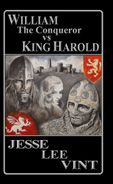
 |
1492. 1776. Certain years have lodged themselves in our cultural memory due to the events they contained that changed the course of Western history. 1066 was another pivotal year as it not only saw a crucial power shift in England that would profoundly affect that part of the world for centuries to come but also because the resulting merger of the Anglo-Saxon and Norman French languages in the war's aftermath would create the foundation for modern English. In a well-researched but fictionalized tale of the two rival leaders in the Norman Conquest, the author gives his readers a human side to a drama that transformed a nation and a people forever.
Although much of the history of the time period is subject to conflicting accounts that are often sketchy at best, Vint has pieced together the known facts and expanded on them with a healthy dose of historical imagination. Even so, the fiction is entertaining and does not detract from the truth in any truly significant way. Events like Harold's shipwreck on the continent, his swearing of at least some form of fealty to William, his coronation as king, his brother's traitorous alliance with Norway's Haarald, and Harold's ultimate defeat at the Battle of Hastings are well documented. His betrothal to William's daughter, Adelize, is also mentioned in at least one historical source, although the details of their relationship are scarce. The presence of Macbeth's son Lulach in the role of the Green Knight seems completely farfetched as he supposedly died in 1058, but it does add a touch of mystery to the plot. Overall, the author has taken one of the most important conflicts in European history and given it a vitality that will perhaps help the history become more palatable to modern readers.